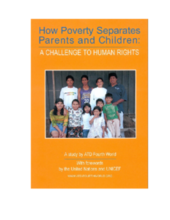No one wants children to suffer the harshness of life in poverty. This can drive some parents to entrust their children to an orphanage or to work in domestic service. It can lead some social workers to remove children from a home because their family is poor. There are times when these are the best options available: the children will be better fed and the parents may have the time to overcome a crisis and build a more stable home. Outcomes are far worse when children leave of their own accord and end up on their own in the streets. But even in the best of circumstances, what children themselves say time and time again is that they know something irreplaceable has been lost when they leave their families and communities. Children in the custody of private institutions or the government are likely to find themselves in a system with scant resources that is seldom held accountable to the families they serve. We owe it to these children to innovate better solutions together.
Poverty is not only the only factor separating parents and children. The phenomena explored in this study – that affect children living in the streets, in foster care, and in other difficult situations – are complex and will not be resolved by any single measure. Parents themselves often show unstinting resilience and courage on behalf of their children. But the enormous efforts necessary to keep a family together in the face of poverty also sap people’s energies and hopes in ways that can delay and even sabotage their attempts to escape poverty.
Safeguarding parent-child relationships is a question of human rights. The Convention on the Rights of the Child affirms that it is in the overriding interest of children that they be brought up in their own families. It envisages separation as the last possible step after doing everything that can be done to support parents in their responsibilities.
Committing to defend the rights of children and families is only the first step. Implementing change requires training, planning, methodology, and evaluation that is developed in partnership with children and families themselves. This begins with a focus on people as active participants in development. Priority must be given to support the efforts made by the very poorest people.
The phenomena explored in this study – that affect children living in the streets, in foster care and in other difficult situations – are complex and will not be resolved by any single measure. Parents themselves often show unstinting resilience and courage on behalf of their children. But the enormous efforts necessary to keep a family together in the face of poverty also sap people’s energies and hopes in ways that can delay and even sabotage their attempts to escape poverty.
Committing to defend the rights of children and families is only the first step. Implementing change requires training, planning, methodology and evaluation that is developed in partnership with children and families themselves.
Six countries are profiled in this study – Guatemala, Haiti, Philippines, United States, the United Kingdom and Burkina Faso.
©International Movement ATD Fourth World

